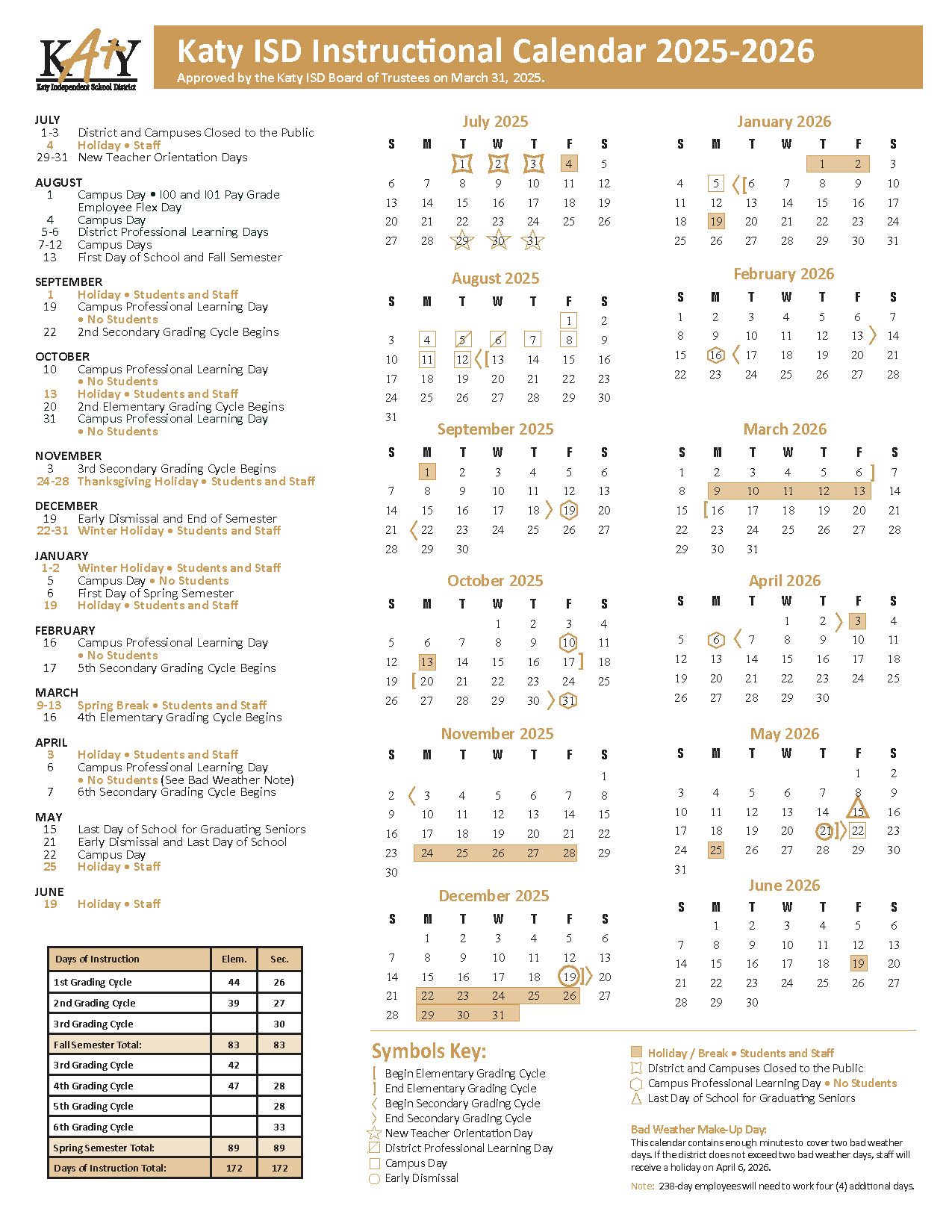
Katy ISD Back-to-School Guide: What Williamsburg Settlement Residents Need to Know
Back-to-school season is officially here in Katy ISD with the first day of school on August 13, 2025, and with it comes busy streets, bustling school zones, and early-morning routines finding their rhythm again. From school bus safety to afternoon latchkey planning and tips on building healthy home habits, there are simple ways for Williamsburg Settlement neighbors and families to work together to make this year’s start safe, smooth, and productive.
For All Residents
The Harris County Precinct 5 Constable’s Office and Fort Bend County Precinct 1 Constable’s Office urge drivers to exercise caution in school zones and near bus stops:
- Reduce speeds in school zones and residential neighborhoods
- Stay alert for children walking and biking
- Stop when a school bus displays flashing red lights and an extended stop sign, unless traveling on the opposite side of a raised median
Violating Texas Transportation Code § 545.066 by passing a stopped school bus can result in fines of $500–$1,250 for a first offense, and up to $2,000 with possible license suspension for repeat offenses within five years. If the violation causes injury, charges can escalate to a Class A misdemeanor or even a state jail felony.
Being a Watchful, Helpful Neighbor
Student safety is a shared community responsibility. Neighbors are encouraged to keep a watchful eye on children walking, biking, or waiting for the school bus—especially during early mornings and afternoons. If something doesn’t seem right, such as a vehicle repeatedly passing by students or lingering near a bus stop, Williamsburg Settlement residents are urged to contact local authorities immediately. A quick phone call can prevent potential dangers and helps ensure every child’s trip to and from school is safe.
For Parents of School-Aged Children
Latchkey Safety & Afternoon Engagement
Constables recommend latchkey kids—students who are home alone after school—follow three core safety rules: lock doors immediately upon arrival, never answer the door for strangers, and check in with parents or guardians as soon as they get home. Parents working from home can schedule quick afternoon “check-in breaks” and encourage productive activities like reading, crafts, or online enrichment programs.
Bedtime & Routine Building
According to the Centers for Disease Control and Prevention (CDC), children aged 6–12 should get 9–12 hours of sleep nightly, and teens should get 8–10 hours. Those with regular bedtime routines are less likely to feel tired during the day and show improved emotional control. Research published in BMC Public Health links consistent bedtimes with stronger attention and school readiness. Experts recommend starting school-year sleep schedules at least one week early, gradually adjusting bedtime by 15–30 minutes, and keeping wake-up times consistent—even on weekends.
Chores & Growth
Integrating chores into daily life builds responsibility, self-esteem, and emotional regulation. According to Psychology Today, children who regularly participate in chores tend to have greater academic success and stronger social skills. The Head Start program notes that age-appropriate chores—even simple ones like picking up toys or setting the table—help children develop executive functioning skills and prepare them for classroom responsibilities.
Clothing Donations
Parents are encouraged to donate outgrown school clothes and shoes to local nonprofits. Even worn items can benefit the community through textile recycling programs that turn non-reusable fabric into funds for charitable initiatives. Find local donation centers here.
School Supplies Donation Drives
Local nonprofits and faith-based organizations in and around Katy ISD are collecting school supplies to ensure all students have what they need to succeed this year. Families can help by donating extra supplies or volunteering to support distribution events. Learn more here.
Tax-Free Weekend Reminder
Take advantage of Texas’ Tax-Free Weekend, happening August 8–10, 2025, for savings on clothes and school supplies. See our full guide here.
Mobile Sidebar Ad
Additional Tips for a Strong Start
Technology & Internet Safety
With more assignments and social connections happening online, parents are encouraged to set clear internet safety guidelines. The American Academy of Pediatrics (AAP) recommends establishing screen time limits, using parental controls, and talking regularly with children about appropriate online behavior and what to do if they encounter cyberbullying or unwanted contact online.
Mental Health & Stress Management
The CDC notes that the back-to-school transition can increase anxiety for some students. Parents can ease stress by:
- Encouraging children to express concerns about school
- Reviewing daily schedules ahead of time
- Practicing calming strategies such as deep breathing or reading before bedtime
Schools also offer counseling support—parents are encouraged to reach out early if concerns arise.
Immunizations & School Readiness
Staying up to date on immunizations is an important part of preparing for the school year. Vaccinations help protect students and the wider community from preventable diseases and are required for school attendance under Texas law. Families can take advantage of free back-to-school vaccination events happening across Harris County Precinct 4 to ensure their children are healthy and ready to learn. Learn more about free vaccination opportunities here.
Nutrition & Healthy Lunch Prep
According to the U.S. Department of Agriculture (USDA), starting the day with a healthy breakfast improves concentration and memory. Parents can also involve kids in planning lunches to encourage healthier choices and reduce food waste.
A Fresh Start for a Bright School Year
The first day of school brings with it a sense of possibility—for students, families, and the entire community. By working together, watching out for one another, and helping kids build healthy routines, we can make this school year not only safe but full of growth and achievement. Whether it’s lending a hand to a neighbor, donating outgrown clothes, encouraging positive after-school activities, or simply offering a friendly wave to kids walking to school, every small act helps create a supportive environment where students can thrive.
Here’s to a successful, safe, and inspiring start to the school year!
 Tiffany Krenek has been on the My Neighborhood News team since August 2021. She is passionate about curating and sharing content that enriches the lives of our readers in a personal, meaningful way. A loving mother and wife, Tiffany and her family live in the West Houston/Cypress region.
Tiffany Krenek has been on the My Neighborhood News team since August 2021. She is passionate about curating and sharing content that enriches the lives of our readers in a personal, meaningful way. A loving mother and wife, Tiffany and her family live in the West Houston/Cypress region.







